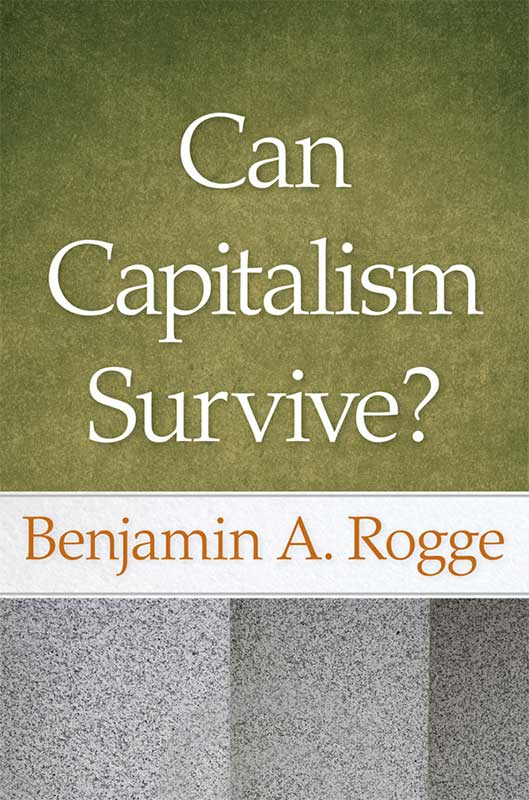Can Capitalism Survive?
By Benjamin A. Rogge
One of the signs of advancing age in the American college professor is a tendency for him to write less and publish more. This seeming paradox is easily explained by the phenomenon of
Collected Works, that is, by what on television would be described as reruns. As in television, no great public outcry is needed to bring forth the reruns; a question from his wife, a polite suggestion from a colleague, and the cut-and-paste operation is under way.I have put together here what I believe to be the best of the rather meager output of my professional career up to this point. For reasons (mostly financial) that always seemed adequate at the moment, I have been more of a speechmaker than a writer. Thus, you will find that many of the pieces in this collection are but speeches put down on paper…. [From the Foreword]
First Pub. Date
1979
Publisher
Indianapolis, IN: Liberty Fund, Inc. Liberty Fund, Inc.
Pub. Date
1979
Comments
Collected essays.
Copyright
The text of this edition is under copyright. Picture of Benjamin Rogge: file photo, courtesy of Liberty Fund, Inc.
- Foreword
- Part I, Introduction
- Part I, Chapter 1, Can Capitalism Survive
- Part II, Introduction
- Part II, Chapter 1, The Case for Economic Freedom
- Part II, Chapter 2, The Libertarian Philosophy
- Part II, Chapter 3, Who is to Blame
- Part II, Chapter 4, Paradise in Posey County
- Part III, Introduction
- Part III, Chapter 1, Adam Smith, 1776-1976
- Part III, Chapter 2, Christian Economics: Myth or Reality
- Part III, Chapter 3, College Economics: Is It Subversive of Capitalism
- Part IV, Introduction
- Part IV, Chapter 1, Profits
- Part IV, Chapter 2, The Businessman
- Part V, Introduction
- Part V, Chapter 1, The Labor Monopoly
- Part VI, Introduction
- Part VI, Chapter 1, The Long-Run Economic Outlook
- Part VI, Chapter 2, Alleged Causes of Inflation, Corporate Monopolies
- Part VII, Introduction
- Part VII, Chapter 1, The Problems of Cities
- Part VIII, Introduction
- Part VIII, Chapter 1, Financing Higher Education in the United States
- Part VIII, Chapter 2, The Promise of the College
- Part IX, Introduction
- Part IX, Chapter 1, The Businessman and the Defense of Capitalism
- Part IX, Chapter 2, Reflections on the Election of 1964
- Part IX, Chapter 3, The Foundation for Economic Education, Success or Failure
Part II, Chapter 3
Who’s To Blame?
In some 63.7 percent of all interviews in my office, the person across the desk is there to tell me who’s to blame. And in 99.6 percent of the cases where that is the question, the answer is the same:
He isn’t.
but—” and then comes ten to ninety minutes of explanation, which is apparently supposed to end in my breaking into tears and forgiving all, after which he goes home to sharpen his little hatchet.
whole story. All the guys over at the house were telling me that it’s a tradition around here to cut down cherry trees. What’s that? Did any of
them ever actually cut down any cherry trees? Well, I don’t know, but anyway there’s this tradition, see, and with all this lack of school spirit, I figured I was really doing the school a favor when I cut down that crummy old tree.” [
Lights up, center stage, where our hero is receiving a medal from the president of the Student Council as the band plays the school song.]
Society on Trial
Lights up, center stage, revealing the kindly old judge admonishing the parents to show more love and affection to little George, who is seated right, quietly hacking away at the jury box.]
The Freudian Ethic:
The Freudian explanation of crime absolves the individual from all personal responsibility for the criminal act and places the blame squarely upon the shoulders of an abstraction—society. Modern society is especially hard upon the individual, since it imposes upon him so many and often contradictory restraints and at the same time demands of him so much that does not come naturally to him. His criminal acts are therefore but a symptom of the underlying pathology of society, and it is as futile to punish him for the sins of society as to attempt to cure acne by medicating the symptomatic pustules.
*16
Responsibility Is Personal
The Freudian Ethic (New York: Duell, Sloan, and Pearce, 1959) p. 166.
Heavens on Earth: Utopian Communities in America 1680-1880, 2d ed. (New York: Peter Smith, 1966), p. 101.
History of American Socialisms (1870), p. 43.
Part III

